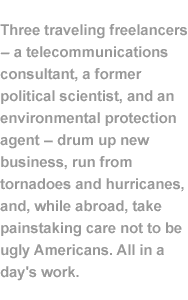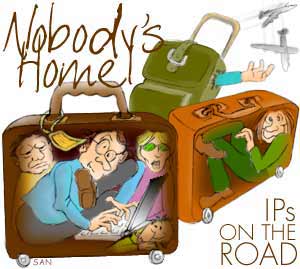 |
|
||||||||||||
 |
|
||||||||||||

|

|
|
By Monique Cuvelier
Planting himself before clients leads to new business
Travel Resources on the Web: biztravel.com travelocity.com travel.epicurious.com mapquest.com excite.com/travel flyaow.com journeywoman.com travelweb.com
|
What's the epitome of freedom? Some IPs would say that it's being exempt from onerous company policies (everyone has to wear Big Bird costumes on Thursdays). Others see it as permission to come and go as they please -- on a whim -- once, twice, three times a day! Others still cherish above all the feeling of freedom -- and for these thrill seekers, the passport-toting jet-setter in the spacious business-class compartment has long been the great symbol of freedom in the workplace. We spoke with three IPs whose work frequently takes them on the road to get a sense for what it's really like. Show Your Face, Win a Prize Wayne Mates designs, sells, and sets up computer software to track and compare long-distance calling expenses for telecommunications businesses, including Lucent Technologies. He's out of town to install software at least twice a month, usually for about two or three days at a time, and he appreciates the diversion of travel. "It changes my attitude," he says. "Otherwise everything is email, faxes, and telephone. There's no substitute for getting out and talking to people face to face." Besides, he says, "I hate being cooped up in one place," and "there's no urgency for me to be back in the office. I can take care of business from anywhere as long as I have a laptop and somewhere to plug it in." Another reason why Mates likes to travel is that planting himself before clients leads to new business. "It happens all the time," he says. "When a customer is spending 50K or more, they want to know who they're dealing with and what they're getting. I had a client in Rochester, N.Y., and they were on the fence for a long time. I finally made a trip out there, sat down, spent the day with the staff going through product demos and designing specifications. By going there and going through this, they came up with a number of ideas of how to personalize the product. Not only did I get the original sale, I got a lot of referrals from it too." When in Rome... Business consultant David Bartlett has a family and a home in Monroe, Wisc., but he's living in Armenia now. His work as an international development consultant takes him all over eastern Europe, Transcaucasia, Central Asia, and the former Soviet Union. Short-term assignments typically last about three months and longer ones from 18 months to two years. The World Bank, the United Nations Development Program, and USAid have all been clients. A little more than a year ago, Bartlett left a job as a political scientist at Vanderbilt University, where he specialized in the economic problems of Third World countries, to become an independent development consultant. He had tired of merely studying the problems from afar, and wanted to use his expertise to actually implement solutions. In Bartlett's case, this means "setting up a Western-style banking system, capital market, stock exchange, financial intermediaries, investment funds, venture capital firms, and so on." The institutional development aspect of his work requires him to establish means of monitoring a new market's health -- prudential regulations, banking supervision, accounting and financial disclosure standards, bankruptcy, and liquidation laws. Most of the development agencies and consulting firms Bartlett could have joined stateside are in Washington -- closer to his Wisconsin home than Armenia, but too far from the troubled regions he hopes to help. "Many folks who work for those agencies spend all or most of their time in Washington. But implementation takes place in the target countries under the supervision of expats working collaboratively with officials from the host states. That's why I spend a lot of my time abroad." Crisp and efficient communication is an important part of any business transaction, and it clearly becomes more difficult in foreign cultures. "I can't recall having made any truly egregious and unforgivable faux pas during my foreign travels, although I may well have unwittingly committed some minor ones that didn't merit comment by my gracious hosts," Bartlett says. "Familiarizing oneself with the culture, history, and business etiquette of one's host country is helpful in avoiding such gaffes, in addition to being intrinsically a good thing to do. So boisterous Americans know to chill out when they travel to places like Scandinavia, where people are fairly reserved. In the case of Armenia, one has to be conscious of that country's singularly tragic history and desist from jokes about Turkey. "Generally speaking," adds Bartlett, "Americans traveling abroad should be sensitive to the fact that people in many countries (including countries that are generally friendly to the U.S.) are simultaneously respectful and admiring of Americans and suspicious (and sometimes fearful) of the motives and policies of the United States as the world's only remaining superpower. I have had to finesse this problem many times over recent months in discussions with Armenians about the Kosovo crisis, for example. So while American travelers should certainly stand their ground when such conversations arise (if they are so inclined), they should be wary of reinforcing the 'ugly American' stereotype and couch their remarks accordingly." For more information about proper business etiquette abroad, visit Etiquette International or Global Protocol. Beware of...Hurricane When John Alderman travels, it's not usually from office to office -- more likely from one vast natural space to another. Alderman is an environmental consultant, a sort of traveling environmental protection agent who evaluates properties for oil and gas companies in the U.S. and abroad (Penzoil, for example). Alderman tells these companies how to ensure that a property they plan to buy or sell is in compliance with state and Federal environmental regulations. "The biggest contingency for me is the weather," Alderman says. His work often takes him into oil country in Texas and Oklahoma where thunderstorms and tornadoes sweep across the land with devastating effect. "One time we were out on the Texas coast when a hurricane hit," he recalls. "The eye hit about a hundred yards up from us. We got all the data we needed and got out of there." Other projects have taken Alderman to Mongolia, India, and Belize, but his most terrifying travel experiences have occurred in the United States. "Outside the country I've never been afraid," he says. "You just watch what you eat and buy bottled water. You're usually working in an office, and those are pretty similar wherever. One of the scariest parts of my job was when I was in east L.A. Boy, we got in there, did what we needed to do, and made sure we were out by dark." Did You Say Adventure? People who stare out the same office window day after day might feel the itch of envy when they contemplate itinerant professionals. They'll daydream of life as a charter ship captain setting off for Barbados from Key West with a crew of paying passengers... But the captain himself might tell you that perpetual motion can start to feel like purgatory, especially when your personal life revolves around people who are anchored somewhere else. While Bartlett, for example, fashions Western economies in eastern outposts, his wife and children are home in Wisconsin. Phone calls and email telescope the psychological distance between Armenia and the land of the Milwaukee Brewers, but electronic mail hardly communicates the warmth of a hug. The emotional toll of separation from loved ones is further compounded by the stress and monotony of repetition: racing to the airport, navigating the streets and culture of unfamiliar cities, and remembering to pack clean underwear fails to induce travel fever when you have to do it every week. For Bartlett, dedication to his work and a dose of idealism offer a savory antidote to the inconveniences of life on the road. "Reminding yourself that your work is making some sort of contribution to society helps to soften the day-to-day annoyances." |
||||
|
| |||||
|
August 26, 1999 Edited by Eric Gershon Illustration by Lawrence San Production by Keith Gendel |
We'd love to hear your comments about this article! Monique Cuvelier is a freelance writer who lives in Boston, Mass. If you like, we'd be happy to put you in touch with her, or with any of the other IPs named in this article. | ||||
| |||||